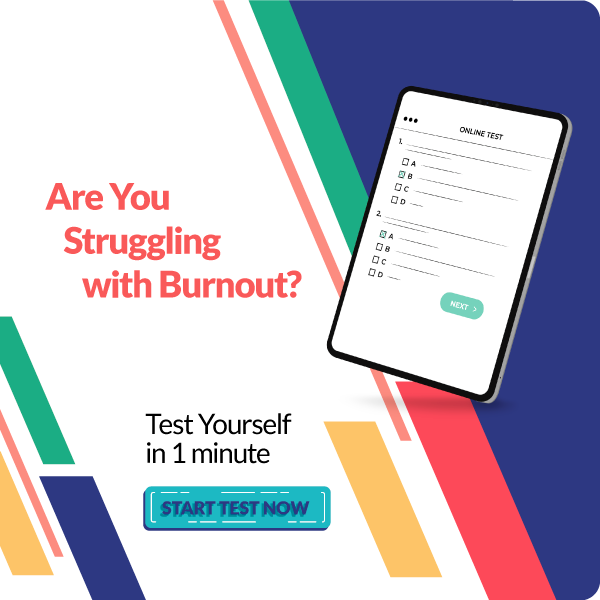Many vets and assistants have heard of Burnout Syndrome on social media, by talking to colleagues or by reading one of the many articles that have been published in the most prestigious journals in the profession. The alarming thing is that these same vets and assistants, immersed in the hustle and bustle of everyday life, don’t have time to think about whether the chronic exhaustion and the inability to face a new day is precisely Burnout.
Maybe this is your case?
Your body doesn’t lie. Discover the physical symptoms of Burnout
Do you have trouble sleeping or wake up at all hours of the night worrying ? Are you exhausted even though you’ve managed to get enough sleep? Do you always need coffee to help you keep up the pace? Ok, we are talking about the first signs of Burnout.
An altered nervous state can also cause abdominal or stomach pain or even irritable bowel syndrome because the digestive system is our second brain. Another physical manifestation of Burnout is skin problems or even sudden tachycardia or chest pain.
Feeling exhausted all day, needing coffee to keep going or having digestive problems can be physical symptoms of Burnout.
How does your mind feel?

Here’s a little test to find out how you really feel. Be honest with yourself.
- Do you prefer to work alone, “getting away” from others?
- Have you lost interest in what you used to enjoy?
- Do you prefer to stay at home instead of going out with friends or getting together with your family?
- Do you feel forgetful?
- Do you go from being elated to extremely depressed?
- Do you feel frustrated or angry when you’re at the clinic?
- Do you find it more and more difficult to do everyday tasks?
- Do you ever think about hurting yourself or others?
If you have answered YES to just half of the questions, you are starting to have symptoms of Burnout.
Mood swings, wanting to work alone, memory loss or being so tired that you don’t feel like going out or seeing anyone are also symptoms of Burnout.
What can I do now to stop Burnout from getting worse?
Luckily, a lot of things. You have to learn to look after yourself a bit more. We know what the profession is like, the responsibility it entails and its long working hours, often poorly paid. Rushed meals at strange hours, taking home reports, no time to do things as basic as shopping or laundry, weekends spent preparing for a conference or attending a congress, etc. This is the reality that many veterinarians experience.
In order to keep up with the pace you need to “pamper yourself” and learn to disconnect. You need to set limits, you need to learn to say NO. You need to take care of your body and mind. The trick is ORGANISATION and EMOTIONAL INTELLIGENCE.
Can we give you some tips on how to take care of your body?

Organise your daily schedule and be strict about it! Stick to mealtimes and sleep schedules.
Organise your diet. Follow a balanced diet that is as home-cooked as possible. Organise your weekly menus and dedicate only one day a week, maximum two, to shopping and batch cooking as professional cooks do to organise themselves. You will get more free time and you will probably save money. In the EatWellVet section you will find tips on how to find time to cook and recipes to take with you to the clinic.
Play a sport you enjoy or learn yoga techniques. Physical activity helps to release serotonin and endorphins that increase feelings of wellbeing. In the VetYogui section of HVP you will find exercises for veterinarians designed by a clinical veterinarian and yoga professional.
Be scrupulous with your schedule, organise your time and practise some sport or yoga to take care of your body.
Take care of your mental health to avoid or overcome Burnout.

Your mind also deserves the best care in order to be at 100% when you need it. Its worst enemy is stress. You can reduce your stress levels by following these healthy rules. You prioritise them yourself!
Rule no. 1. Learn to disconnect from work. It is very important that “the patients” stay in the clinic. Look at yourself as an individual and not just as a veterinarian. Listen to your favourite music, read a good book, enjoy playing with your kids if you have a family or practice some sport with your pet. Tomorrow is another day!
Switch off, unplug and disconnect. Go out with your friends and have fun. And, above all, learn to talk about what’s going on with you.
Rule no. 2. Set realistic goals. We all have dreams and aspire to be the best in our careers, but maybe your individual circumstances don’t enable you to do so at the moment. Decide what’s most important in your life and don’t feel guilty if work doesn’t come first. And don’t try to do everything perfectly! You’re human, not a superhero.
Rule no. 3. Socialise with your friends and family. Social contact is crucial to switching off from work. And please, no talking about patients if your friends are also veterinarians!
Rule no. 4. Learn to express what’s bothering you. Externalising and verbalising our feelings is a great way to break down a problem to its true proportions. Besides, who knows – our friend’s or partner’s point of view might help you see things differently.
If you think you’ve reached your limit, please do not hesitate to reach out to a psychologist for professional help before the symptoms get worse.
Do you want to know more about Burnout? Download “12 Burnout symptoms. Find out if this is happening to you” and find out more about this condition. You will also find many suggestions to put into practice in veterinary centres to avoid Burnout. Do you want to offer them in your clinic?









